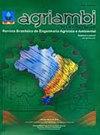Soil quality in two coffee crop systems in the Amazon biome
IF 1.4
4区 农林科学
Q3 AGRICULTURAL ENGINEERING
Revista Brasileira de Engenharia Agricola e Ambiental
Pub Date : 2020-01-01
DOI:10.1590/1807-1929/agriambi.v24n6p379-384
引用次数: 1
Abstract
ABSTRACT The form of occupation of the state of Rondônia, Brazil, favored the extensive agriculture, which resulted in a fast deforestation. The removal of forests and inadequate soil management and use, combined with a hot and wet climate, affected the soil chemical, physical, and biological attributes. In search for less impacting and alternatives that promote greater soil conservation for coffee production in the North region of Brazil, the objective of this work was to evaluate the effects of two coffee crop systems on the soil chemical and microbiological attributes. The treatments consisted of a shaded coffee crop (SCC) and a full-sun coffee crop (FCC). A completely randomized design was used, with four clusters per treatment and seven sampling points per cluster, which constituted a replication, totaling 28 replications per treatment. The data were collected in April 2018, in a rural property in the municipality of Cacoal, state of Rondônia, Brazil (11º21’50’’S, 61º20’10’’W, and altitude of 238 m). The soil organic matter, pH, P, K, Ca, Mg, Al, H+Al, base saturation, and basal respiration were determined. The soil under SCC had higher Ca content, pH, and base saturation, and lower potential acidity (H+Al) and Al content than that under FCC. The litterfall on the soil under FCC presented higher N and Mg contents. The soil basal respiration increased in the first 5 cm depth in the treatment with SCC.亚马逊生物群中两种咖啡作物系统的土壤质量
巴西Rondônia国的占领形式偏向于粗放的农业,这导致了森林的迅速砍伐。森林的砍伐和不适当的土壤管理和利用,加上炎热潮湿的气候,影响了土壤的化学、物理和生物特性。为了在巴西北部地区寻找影响较小的替代品,促进更大程度上保持咖啡生产的土壤,这项工作的目的是评估两种咖啡作物系统对土壤化学和微生物特性的影响。这些处理包括遮荫咖啡作物(SCC)和全日光咖啡作物(FCC)。采用完全随机设计,每组4个组,每组7个采样点,构成一个重复,每组共28个重复。数据于2018年4月在巴西Rondônia州Cacoal市的一个农村地区(11º21 ' 50 " S, 61º20 ' 10 " W,海拔238 m)收集,测定了土壤有机质、pH、P、K、Ca、Mg、Al、H+Al、碱饱和度和基础呼吸。SCC处理下土壤的Ca含量、pH和碱饱和度高于FCC处理,潜在酸度(H+Al)和Al含量低于FCC处理。FCC处理下土壤凋落物N、Mg含量较高。SCC处理前5cm深度土壤基础呼吸增加。
本文章由计算机程序翻译,如有差异,请以英文原文为准。
求助全文
约1分钟内获得全文
求助全文
来源期刊

Revista Brasileira de Engenharia Agricola e Ambiental
Agricultural and Biological Sciences-Agronomy and Crop Science
CiteScore
2.70
自引率
16.70%
发文量
114
审稿时长
3-8 weeks
期刊介绍:
A Revista Brasileira de Engenharia Agrícola e Ambiental (Agriambi), periódico oficial da Asociación Latinoamericana y del Caribe de Ingeniería Agrícola (ALIA), é editada mensalmente, no formato eletrônico, pela Unidade Acadêmica de Engenharia Agrícola (UAEA) do Centro de Tecnologia e Recursos Naturais (CTRN) da Universidade Federal de Campina Grande (UFCG), destinando-se à divulgação de artigos científicos originais e inéditos, elaborados em Português, Inglês ou Espanhol. Com o auxílio de pareceres de Consultores, os artigos são aceitos ou não pela Equipe Editorial para publicação na Revista. A Agriambi aceita, também, a submissão de contribuições na modalidade de revisão de literatura.
 求助内容:
求助内容: 应助结果提醒方式:
应助结果提醒方式:


